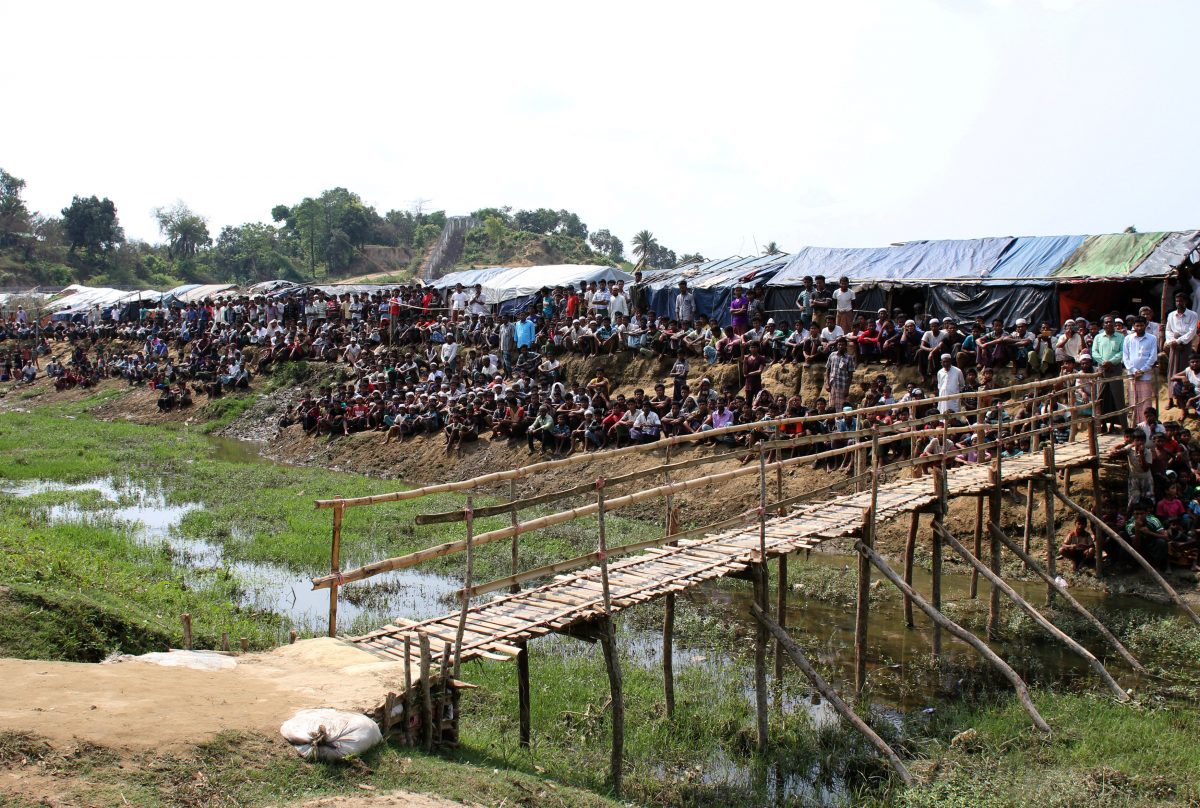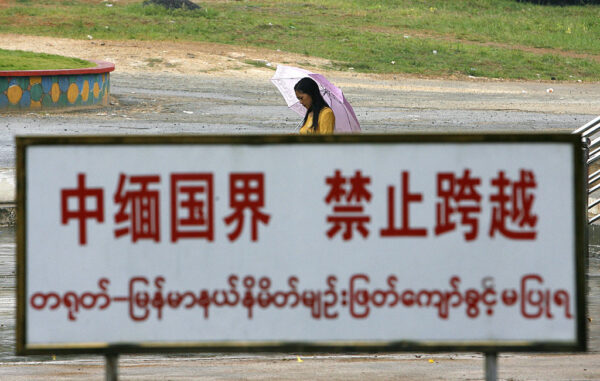US Renews Burma Emergency Amid China Threat
Commentary President Joe Biden on Feb. 6 renewed the national emergency with respect to the situation in Burma, also called Myanmar. This Southeast Asian country is pivotal to China’s plans for expansion in the Indian Ocean, which threatens the national security of both the United States and India. Burma is home to 135 ethnic minorities, many of which have suffered repression and genocide at the hands of the Burman majority. In 1947, when Burma gained independence from Britain, some of the ethnic states were guaranteed that they could exit the Union of Burma if they felt their interests were not being met. When the Karen ethnic group tried to withdraw from the Union in 1949, the Burmese government refused, and fighting broke out. The war is still going on today, making it the longest-running armed conflict in the world. Over the decades, other ethnic resistance groups have joined the fight, taking up arms against the military government. In 2016, the military allowed a fair election, which the National League for Democracy won by a landslide. Nobel Prize winner Aung San Suu Kyi, who had been under house arrest for the better part of three decades, became the face of the new, democratic government. In practice, however, she had very little power because the military retained the majority of parliamentary seats as appointed positions. In February 2021, shortly after she won reelection by an even greater margin, the military seized control of the government. The generals imprisoned Suu Kyi and numerous members of her cabinet, as well as pro-democracy lawmakers and activists. Fighting broke out across the country as ethnic Burmans who saw no other way to restore democracy took up arms against the military. Since the coup began, 3,000 people have been killed, 1.5 million have been internally displaced, 13,000 have been imprisoned, and an estimated 7.8 million children are out of school. This total does not count the 90,000 now sheltering in refugee centers in Thailand. Refugees are seen at the Cox’s Bazar refugee camp in Bangladesh, near Rakhine state, Burma, during a trip by United Nations envoys to the region, on April 29, 2018. (Michelle Nichols/Reuters) Democratic countries around the world condemned the coup and imposed sanctions. The U.S. Congress passed the “Burma Unified through Rigorous Military Accountability Act of 2022,” which allows the U.S. government to engage with the Burmese government in exile while bringing additional sanctions against the military junta. China not only refused to go along with the sanctions, but also blocked a United Nations Security Council resolution condemning the coup. In fact, Beijing dispatched its foreign minister to Naypyidaw, the country’s capital, pledging its support for the generals. Playing the role of “a friend in time of need,” China and Russia have both found ways to benefit from Burma’s alienation from the rest of the world. Moscow pledged to strengthen ties with the generals, selling them weapons, including fighter jets. At the same time, Beijing funds the generals, providing the junta with investment as well as purchasing raw materials from the country. Beijing is moving forward with the China-Myanmar Economic Corridor. Pipelines run through Burma to Yunnan, China, allowing Beijing to transfer oil and gas without braving the Strait of Malacca, which is patrolled by the U.S. Seventh Fleet. Additionally, the establishment of the Kyaukpyu Special Economic Zone and deep sea port in western Burma’s Rakhine State provides China access to the Bay of Bengal in the Indian Ocean. A Burmese woman walks behind a warning sign along the boundary line in the China-Burma border town of Wanding, in China’s southwestern province of Yunnan, on Sept. 27, 2007. (STR/AFP via Getty Images) Over the years, the Chinese Communist Party (CCP) has been slowly expanding its operations into the Indian Ocean. As part of the People’s Liberation Army (PLA) Navy’s involvement in international anti-piracy missions, China has docked submarines in Africa and Sri Lanka. In 2017, the PLA established its first overseas base in the African nation of Djibouti. Through some clever debt diplomacy, a CCP-led joint venture was able to take control of Sri Lanka’s Hambantota Port. Beijing sells weapons to Bangladesh and is positioning missiles in the country. And Beijing is in talks with Pakistan, India’s archrival, to provide it with submarines. The CCP threat is bringing India and the United States closer together, but Russia is a sticking point in the relationship. During the Cold War, India maintained a friendship with the Soviet Union, purchasing weapons under the guise of its policy of non-alignment. Today, India maintains a similar policy toward the Russian Federation, refusing to condemn the Ukraine war at the United Nations. India also refuses to participate in Western sanctions, and continues to purchase Russian oil and weapons. On the other hand, the CCP threat is very concerning

Commentary
President Joe Biden on Feb. 6 renewed the national emergency with respect to the situation in Burma, also called Myanmar. This Southeast Asian country is pivotal to China’s plans for expansion in the Indian Ocean, which threatens the national security of both the United States and India.
Burma is home to 135 ethnic minorities, many of which have suffered repression and genocide at the hands of the Burman majority. In 1947, when Burma gained independence from Britain, some of the ethnic states were guaranteed that they could exit the Union of Burma if they felt their interests were not being met. When the Karen ethnic group tried to withdraw from the Union in 1949, the Burmese government refused, and fighting broke out. The war is still going on today, making it the longest-running armed conflict in the world. Over the decades, other ethnic resistance groups have joined the fight, taking up arms against the military government.
In 2016, the military allowed a fair election, which the National League for Democracy won by a landslide. Nobel Prize winner Aung San Suu Kyi, who had been under house arrest for the better part of three decades, became the face of the new, democratic government. In practice, however, she had very little power because the military retained the majority of parliamentary seats as appointed positions. In February 2021, shortly after she won reelection by an even greater margin, the military seized control of the government. The generals imprisoned Suu Kyi and numerous members of her cabinet, as well as pro-democracy lawmakers and activists. Fighting broke out across the country as ethnic Burmans who saw no other way to restore democracy took up arms against the military.
Since the coup began, 3,000 people have been killed, 1.5 million have been internally displaced, 13,000 have been imprisoned, and an estimated 7.8 million children are out of school. This total does not count the 90,000 now sheltering in refugee centers in Thailand.

Democratic countries around the world condemned the coup and imposed sanctions. The U.S. Congress passed the “Burma Unified through Rigorous Military Accountability Act of 2022,” which allows the U.S. government to engage with the Burmese government in exile while bringing additional sanctions against the military junta. China not only refused to go along with the sanctions, but also blocked a United Nations Security Council resolution condemning the coup. In fact, Beijing dispatched its foreign minister to Naypyidaw, the country’s capital, pledging its support for the generals. Playing the role of “a friend in time of need,” China and Russia have both found ways to benefit from Burma’s alienation from the rest of the world.
Moscow pledged to strengthen ties with the generals, selling them weapons, including fighter jets. At the same time, Beijing funds the generals, providing the junta with investment as well as purchasing raw materials from the country. Beijing is moving forward with the China-Myanmar Economic Corridor. Pipelines run through Burma to Yunnan, China, allowing Beijing to transfer oil and gas without braving the Strait of Malacca, which is patrolled by the U.S. Seventh Fleet. Additionally, the establishment of the Kyaukpyu Special Economic Zone and deep sea port in western Burma’s Rakhine State provides China access to the Bay of Bengal in the Indian Ocean.

Over the years, the Chinese Communist Party (CCP) has been slowly expanding its operations into the Indian Ocean. As part of the People’s Liberation Army (PLA) Navy’s involvement in international anti-piracy missions, China has docked submarines in Africa and Sri Lanka. In 2017, the PLA established its first overseas base in the African nation of Djibouti. Through some clever debt diplomacy, a CCP-led joint venture was able to take control of Sri Lanka’s Hambantota Port. Beijing sells weapons to Bangladesh and is positioning missiles in the country. And Beijing is in talks with Pakistan, India’s archrival, to provide it with submarines.
The CCP threat is bringing India and the United States closer together, but Russia is a sticking point in the relationship. During the Cold War, India maintained a friendship with the Soviet Union, purchasing weapons under the guise of its policy of non-alignment. Today, India maintains a similar policy toward the Russian Federation, refusing to condemn the Ukraine war at the United Nations. India also refuses to participate in Western sanctions, and continues to purchase Russian oil and weapons.
On the other hand, the CCP threat is very concerning for New Delhi. Surrounded by the Indian Ocean on three sides and the Himalayas on the other, the ocean represents India’s lifeline to the world—both economically and politically—and plays heavily in the country’s national defense. This gives Washington a chance to gradually bring India into the American orbit. The two countries are both part of the anti-CCP Quadrilateral Security Dialogue (the Quad), along with Japan and Australia. Moving forward, naval and military cooperation between New Delhi and Washington can be expected to intensify. In December, India welcomed a visit from a U.S. Navy nuclear submarine, sending a clear message to Beijing.
Burma had scheduled elections for February, but the junta canceled them when they extended the state of emergency due to the civil war. Consequently, Burma’s relationship with Beijing will continue without interruption, while the PLA Navy’s incursions into the Indian Ocean are expected to increase. Hopefully, the United States and India can get past their differences regarding Russia and be ready to stand united against China.
Views expressed in this article are the opinions of the author and do not necessarily reflect the views of The Epoch Times.












